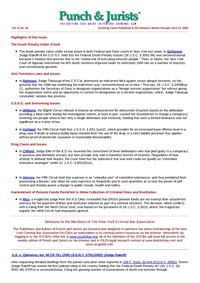Loaded on
June 1, 2002
published in Punch and Jurists
June 17, 2002
Here the Court vacated the convictions of three defendants who had pled guilty to a conspiracy to possess and distribute ecstacy, but who actually only sold a harmless mixture of vitamins, since that substance was not a controlled substance analogue.
Can a defendant be prosecuted under the Federal …
Loaded on
June 1, 2002
published in Punch and Jurists
June 17, 2002
Here Judge Rakoff held that the Federal Death Penalty statute (18 USC § 3591-98) was unconstitutional because it violates due process due to the “undue risk of executing innocent people” - the first judicial ruling to so hold since the statute was enacted.
After requesting detailed briefings from …
Loaded on
June 1, 2002
published in Punch and Jurists
June 17, 2002
This case is noted for its rejection of numerous challenges to convictions under the Analogue Act (18 USC § 813) for unlawful possession and use of gamma-butyrolactone (GBL) - commonly referred to as the "date-rape drug".
Here the Court held that the Analogue Act (21 U.S.C. § 813), …
Loaded on
June 1, 2002
published in Punch and Jurists
June 17, 2002
Pro se petitioner inmate was convicted of drug offenses and asserted that he received ineffective assistance of counsel. The inmate appealed the order of the United States District Court for the Southern District of Georgia which dismissed the inmate's petition under 28 U.S.C. § 2255 as an unauthorized successive …
Loaded on
June 1, 2002
published in Punch and Jurists
June 17, 2002
Here the Court dismissed an indictment filed against 7 alleged terrorists, on the grounds that the 1996 law underlying the indictment was unconstitutional on its face since it provided the organization no notice or opportunity to contest the designation.
One of the many controversial provisions included in the …
Loaded on
June 1, 2002
published in Punch and Jurists
June 17, 2002
With the help of a cooperating witness, the FBI was conducting an ongoing investigation into the sale of cocaine base in Arkansas. Because its own witness was confused about the identity of the person from whom it had been buying drugs, the FBI requested the local police to stop …
Loaded on
June 1, 2002
published in Punch and Jurists
June 17, 2002
The defendant in this case was convicted in state court, following a bench trial, of murder, robbery, and theft. A jury then sentenced defendant to death. The judgment and conviction were affirmed on appeal. Defendant then filed a petition for a writ of habeas corpus, under 28 U.S.C. § …
Loaded on
June 1, 2002
published in Punch and Jurists
June 17, 2002
No Apprendi violation in court's application of U.S.S.G. § 2D1.1(c)(1) to determine a base offense level where appellant was not sentenced in excess of twenty years under 21 U.S.C. § 841(b) for drug conviction; imposition of consecutive sentence did not violate Apprendi.
Loaded on
June 1, 2002
published in Punch and Jurists
June 17, 2002
Here, disagreeing with at least one Circuit Court decision which held to the contrary, Magistrate Judge Joyner held that the Government was authorized to utilize the provisions of the Federal Debt Collection Procedure Act (28 U.S.C. §§ 3001-3308) to levy upon pension funds in order to enforce collection of …
Loaded on
June 1, 2002
published in Punch and Jurists
June 17, 2002
Among the many and growing categories of persons who are prohibited by Federal law from possessing firearms is any person “who is an unlawful user of or addicted to any controlled substance.” (18 U.S.C. § 922(g)(3)). While the term “addict” is defined in 21 U.S.C. § 802(1), the term …
Loaded on
June 1, 2002
published in Punch and Jurists
June 17, 2002
Section 2D1.1(a)(2) of the Guidelines establishes a base offense level of 38 if a defendant is convicted of drug trafficking under 21 U.S.C. § 841(b) “and the offense of conviction establishes that death or serious bodily injury resulted from the use of the substance.” In the instant case, four …
Loaded on
June 1, 2002
published in Punch and Jurists
June 17, 2002
Here the Court held that there is no Apprendi error where the district court could have imposed the same punishment simply by imposing consecutive sentences; calculation of quantity of drugs attributable to appellant upheld where supported by sufficient evidence, and a minor error in calculation added very little
to …
